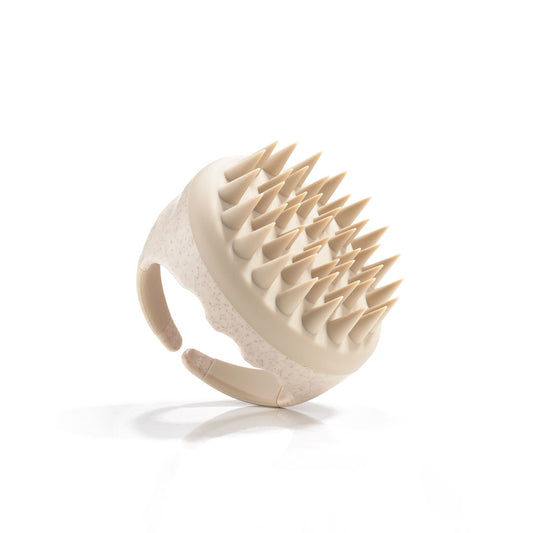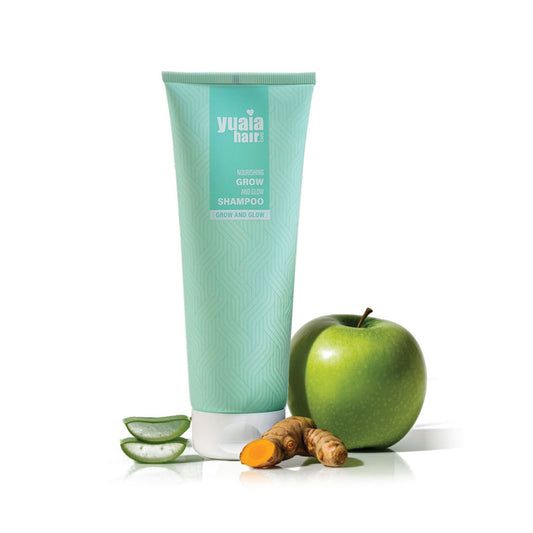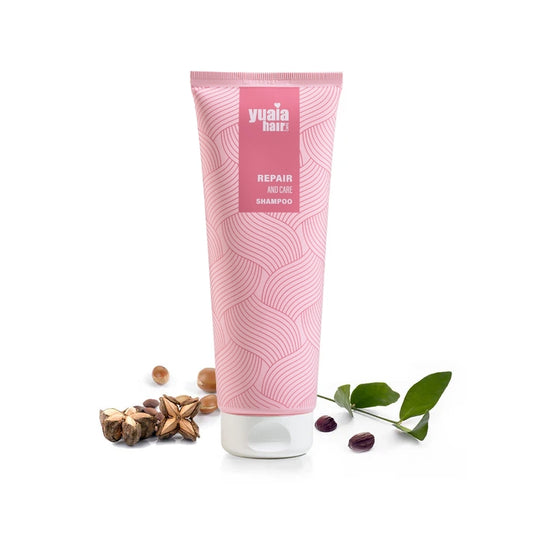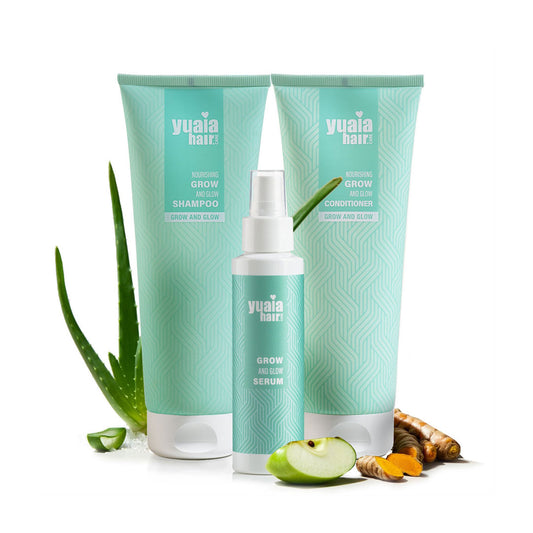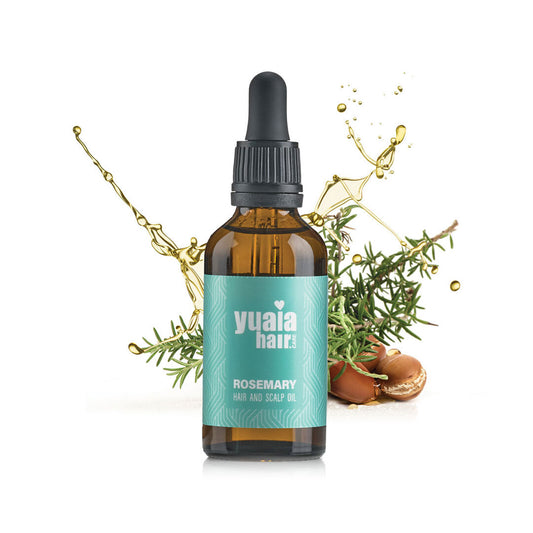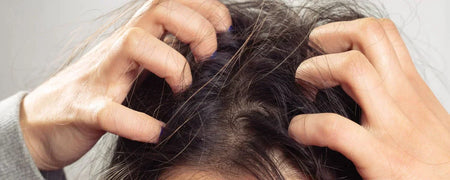
Symptoms of scalp sores
Itching and irritation, redness and swelling as well as pain or tenderness to the touch can all be symptoms of scalp sores. If you experience any of these symptoms, it may be a good idea to examine your scalp for any damage or infection. Sometimes even small skin scrapes on the scalp can lead to bigger problems like scratches, dry skin or even sores.
Other possible symptoms of the sores include itching of the area, irritated skin and dryness. If your scalp is moist or oily, this can also contribute to the development of the sores. The most important thing is to treat these sores as soon as possible to avoid major infections or further damage to your scalp.
Symptoms of scalp ulcers:
- Itching and irritation
- Redness and swelling
- Pain or tenderness to touch
- Dryness
- Dandruff
- Moist / oily skin

Causes of scalp sores
If you experience sores on the scalp, it may be due to damage to the skin as a result of severe scratching or itching. This can result in an irritated and itchy scalp that is dry and flaky. Folliculitis, inflammation of the hair follicle, can also cause sores on the scalp. It often appears as small red bumps with pus on top.
Psoriasis or eczema of the scalp is another possible cause of sores and itchy skin. This is usually due to excess dryness and lack of humidity in the area. Symptoms include dry flakes of skin that fall apart when brushing your hair and intense itching. A moisturizing shampoo can help alleviate these symptoms and improve the overall health of your hair and scalp.

How can scalp sores be treated?
Scalp sores can be painful and uncomfortable. An effective home treatment includes keeping the area clean and dry, avoiding hairspray and styling products, and using a mild shampoo. If the wound is deep or does not heal after a few days, it is recommended to see a doctor.
Mild Shampoos
Medical treatment for scalp ulcers may include antibiotics, steroid creams, or surgery depending on the cause of the ulcer. It is important to follow the prescribed treatment plan to ensure complete healing and prevent further infections. Prevention of scalp sores can be achieved by regular hair washing, using a soft brush and avoiding sharp objects on the head such as combs with sharp teeth or barrettes that are tightly attached to the hair.
Home treatments
Using tea tree oil can be an effective home treatment for scalp sores. Tea tree oil has antibacterial properties that can fight infections and reduce inflammation. Gently massage a few drops of tea tree oil into your scalp and leave it on overnight for best results.
Aloe vera gel is also a good home treatment to relieve itching and irritation caused by scalp sores. Aloe vera contains natural healing properties that can soothe the skin and reduce inflammation. Apply a small amount of aloe vera gel directly to the affected areas several times a day.
Applying coconut oil to soothe the scalp is another effective home remedy for treating scalp sores. Coconut oil has antimicrobial properties that can help fight bacteria and fungal infections as well as moisturize dry skin. Warm some coconut oil between your fingers and gently massage into your scalp before bed or after bathing for best results.
We can also highly recommend our grow and glow series, which contains ingredients that are particularly effective in treating irritated scalps and dandruff. You can find the series right here.
Prevention of scalp sores
Wash your hair regularly with a mild shampoo to avoid oil and dirt build-up. It can help reduce the risk of scalp sores, as excess oil and dirt can clog pores and promote bacterial growth. Also avoid overuse of styling products or chemicals that can irritate the scalp and lead to inflammation. A clean comb or brush is also important to avoid the spread of bacteria on the scalp, so make sure to keep them clean by regular cleaning. These simple steps will help you prevent scalp sores in the long term.

Should you see a doctor if you have a sore on the scalp?
Yes, it is always a good idea to see a doctor if you have a sore on the scalp. Scalp sores can be caused by various reasons, such as infections, allergies, skin diseases or even scalp injuries. If the wound doesn't heal or gets worse, it could be a sign that something more serious is going on. In addition, scalp sores can also be very painful and lead to discomfort and itching. That's why it's best to get it checked out by a doctor to make sure there's nothing that needs treatment. And remember, it is better to be on the safe side and seek medical attention than to ignore the problem and risk further complications.
How Can You Tell If Your Scalp Soreness is a Sign of Infection?
If you have ever wondered, "Why is my scalp sore," you might be dealing with an infection. Scalp soreness can be caused by various factors, including infection. Scalp soreness can be a sign of infection if you are experiencing symptoms such as redness, swelling, or tenderness on the scalp. Other signs include the presence of pimples, pustules, or sores that may ooze pus. You may have it along with itching, burning, or stinging sensations on the scalp. Hair loss or thinning in the affected area can also indicate an infection.
If you notice these symptoms, it is necessary to see a doctor for proper diagnosis and treatment. They can prescribe medications like antifungals, antibiotics, or antivirals, depending on the type of infection. This will help clear up the issue and alleviate your scalp soreness.

Types of Scalp Infections
If you are wondering about - why is my scalp sore to the touch, it may be due to an infection. Let us explore the types of scalp infection.
- Fungal Infections: Caused by fungi like ringworm, causing red, itchy patches on the scalp.
- Bacterial Infections: Caused by bacteria, leading to painful, pus-filled sores.
- Viral Infections: Caused by viruses like herpes, resulting in painful blisters on the scalp.
Can Scalp Soreness Be Linked to Hair Loss?
Yes, scalp soreness can be linked to hair loss in a few ways. Here's what may happen.
- Inflammation: Scalp conditions like psoriasis, dermatitis, or infections can cause inflammation. This disrupts the hair growth cycle and can lead to hair loss.
- Scalp damage: Scratching a sore scalp can damage hair follicles, leading to temporary or permanent hair loss.
- Nutrient flow: Inflammation or infection can restrict blood flow to the scalp, limiting the nutrients reaching hair follicles and potentially causing hair loss.
Not all scalp soreness leads to hair loss. However, if you are experiencing both and it concerns you, see a doctor or dermatologist. They can diagnose the cause and recommend treatment to address both the scalp soreness and hair loss.
Could Your Hair Products Lead To Scalp Soreness?
Yes, certain hair products can lead to scalp soreness. Harsh chemicals in shampoos, conditioners, hair dyes, and styling products can irritate the scalp. They can cause redness, itching, and soreness. Ingredients like sulfates, parabens, and fragrances are bad for hair and scalp health.
Also, overuse of styling products or not rinsing them out properly can lead to product buildup. It can also irritate the scalp. If you want to know how to soothe a sore scalp, consider switching to gentler, more natural hair products.
Is Your Diet Making Scalp Infection Worse?
Diet can play a role in scalp infections. Here is how it can affect your scalp. A diet high in sugar, processed foods, and unhealthy fats can worsen inflammation in the body. This can contribute to scalp issues like dandruff and seborrheic dermatitis. It can create an environment for infections to thrive.
Deficiencies in vitamins like B vitamins, zinc, and omega-3 fatty acids can weaken your immune system. It can make you more susceptible to infections overall, including scalp infections.
Here's what you can do:
- Eat a balanced diet: Focus on whole foods like fruits, vegetables, lean proteins, and whole grains.
- Hydrate: Drinking plenty of water helps keep your skin and scalp healthy.
- Consider supplements: Consult a doctor to see if supplements like zinc or omega-3s might be helpful.
Remember: Diet is one factor. If you suspect a scalp infection, see a doctor for proper diagnosis and treatment.
Treatment for Scalp Infections
Scalp infection treatment depends on the type of infection. Here's a quick guide:
- Fungal infections (ringworm): Antifungal shampoos, creams, or pills are typically prescribed by a doctor.
- Bacterial infections (folliculitis): Topical antibiotics or medicated washes might be recommended. In severe cases, oral antibiotics may be needed.
- Yeast infections (seborrheic dermatitis): Antifungal shampoos containing ketoconazole, selenium sulfide, or zinc pyrithione are common treatments. Doctors might suggest medicated creams or lotions too.
It's essential to follow your doctor's instructions carefully and complete the full course of medication.

Conclusion
Scalp soreness can sometimes be a sign of infection, especially if you experience symptoms like redness, swelling, or sores. If you suspect that your scalp soreness is due to an infection, it's essential to see a doctor for proper diagnosis and treatment. You can effectively treat scalp infections and prevent them from recurring with prompt and appropriate care.
 2-5 day delivery
2-5 day delivery
 25.000+ satisfied customers
25.000+ satisfied customers
 Satisfaction Guarantee
Satisfaction Guarantee



















